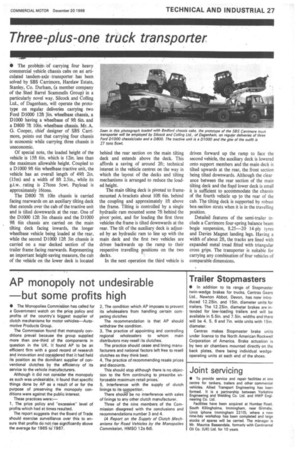AP monopoly not undesirable but some profits high
Page 29

If you've noticed an error in this article please click here to report it so we can fix it.
• The Monopolies Commistion has called for a Government watch on the price policy and profits of the country's biggest supplier of clutch mechanisms for motor vehicles—Automotive Products Group.
The Commission found that monopoly conditions prevail because the group supplied more than one-third of the components in question in the UK. It found AP to be an efficient firm with a good record of research and innovation and considered that it had held its position as the dominant supplier of conventional clutches by the efficiency of its service to the vehicle manufacturers.
Although it did not confider the monopoly as such was undesirable, it found that specific things done by AP as a result of or for the purpose of preserving the monopoly conditions were against the public interest.
These practices were: 1, The price policy and "excessive" level of profits which had at times resulted.
The report suggests that the Board of Trade should exercise surveillance over this to ensure that profits do not rise significantly above the average for 1965 ta 1967.
2, The condition which AP imposes to prevent its wholesalers from handling certain competing clutches
The recommendation is that AP should withdraw the condition.
3. The practice of appointing and controlling regional wholesalers to whom main distributors may resell its clutches.
The practice should cease and lining manufacturers and national factors left free to resell clutches as they think best.
4, The practice of recommending resale prices and discounts.
This should stop although there is no objection to the firm continuing to prescribe enforceable maximum retail prices: 5. Interference with the supply of clutch linings to its cpsppetitor.
There shotird be no interference with sales of linings to any other clutch manufacturer.
Three of the nine members of the Commission disagreed with the conclusions and recommendations number 3 and 4.
(A Report on the Supply of Clutch Mechanisms for Road Vehicles by the Monopolies Commission, HMSO 12s 6d).


























































































